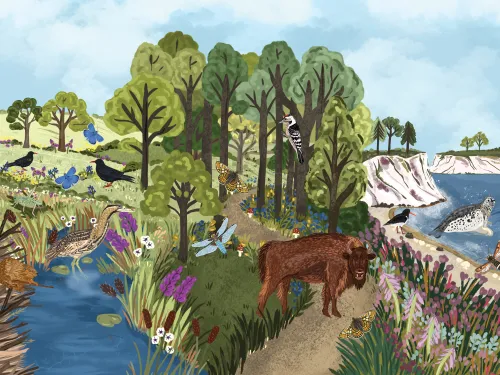
Kent’s wildlife on the brink: £3 million appeal launched to save nature
Kent’s wildlife on the brink: £3 million appeal launched to save nature
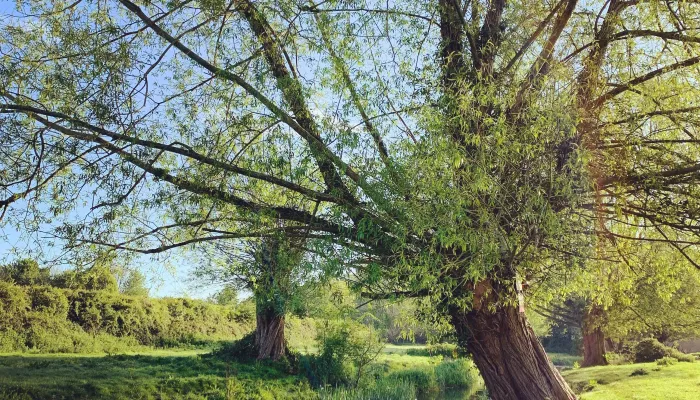
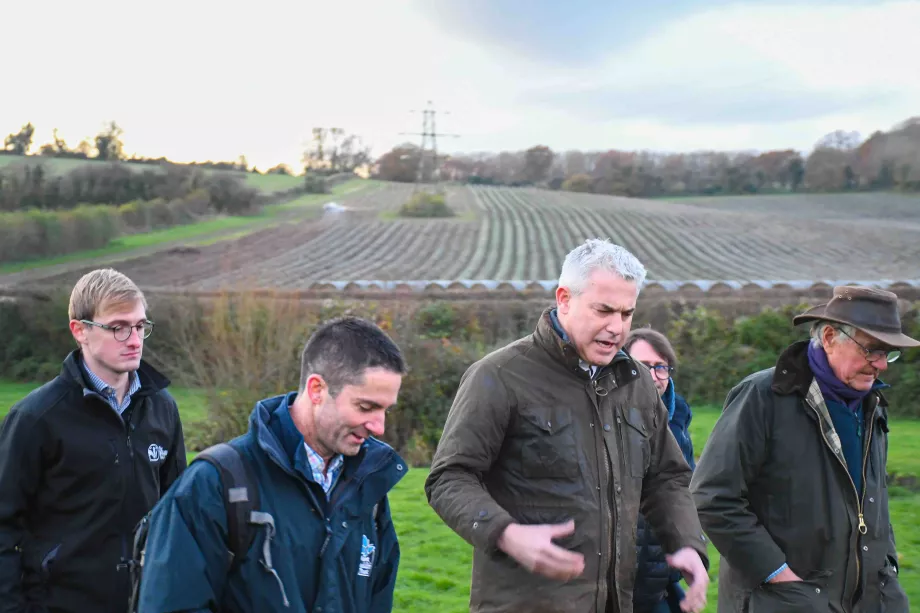
Steve Barclay with Marc Crouch and landowners
During the visit, the Minister announced a new package of measures including launching a search for a new National Park, 34 new landscape recovery projects and funding to help more children get outdoors and into the great British countryside. The series of nature pledges comes ahead of COP28, which begins later this week.
The Darent Valley Nature Recovery Project was established as a pilot last year after being awarded funding from DEFRA. It is a culmination of work between the Darent Valley Farmer Cluster and supported by Kent Wildlife Trust, Kent Downs National Landscape, South East Rivers Trust, North West Kent Countryside Partnership, and the Environment Agency.
The theme of the project is River Restoration seeking to protect and restore the River Darent, a globally rare chalk stream, facing many threats and challenges, not least low flows due to aquifer abstraction and climate change. The project will examine how the river could be made to function more naturally, with varied flows and speeds, and freer of sediment to support a wider range of species using Natural Flood Management techniques.
Over the past year, the farmers have worked with partners, including Kent Wildlife Trust, to develop plans to improve biodiversity, flood mitigation, and drought resilience. The group has been working on a range of natural solutions to create more diverse habitats, slow the flow of water, reduce flash flooding, and build areas of temporary water storage. This in turn will help to recharge the chalk aquifers which produce clear water.
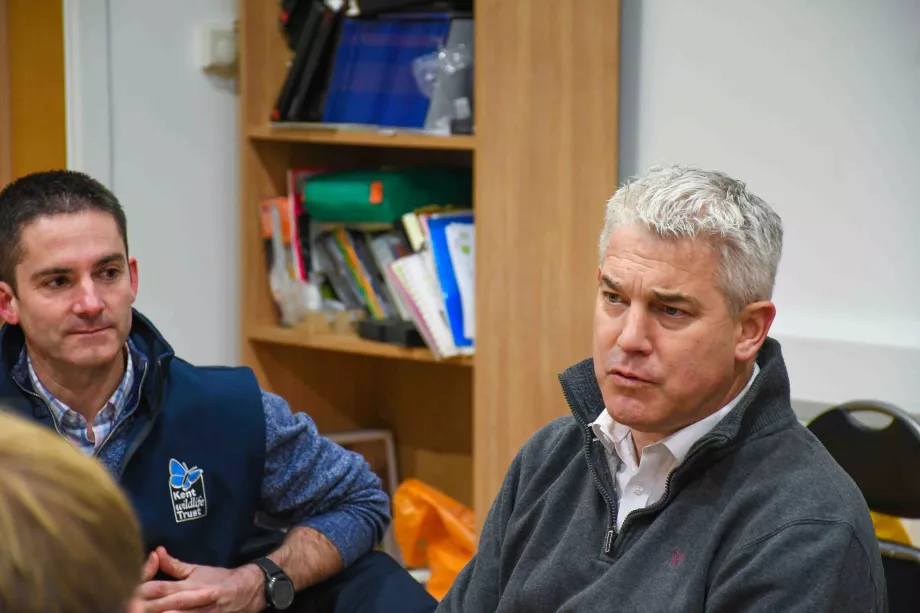
Steve Barclay with Marc Crouch
Environment Secretary Steve Barclay said:
“Nature is at the foundation of food production, water security, and is critical to our economy, and our mental and physical health. It is why it is so important to deliver on our commitment to halt the decline of nature and safeguard at least 30 percent of our extraordinary landscapes.
“Through our Environmental Improvement Plan and today’s announcement, we are creating more opportunities for people to access nature, spend time outdoors and enjoy our beautiful countryside – as well as supporting wildlife. A healthy natural environment is critical for our wellbeing, our economy and combatting climate change.”
Kent Wildlife Trust’s Marc Crouch, Darent Valley Landscape Recovery Project Manager said:
“It is encouraging that the government recognise the huge value that projects like this have, not only in terms of nature recovery but also in food production.
“Through our restoration work, we aim to boost biodiversity with the river functioning as a corridor for wildlife and connected with the landscape. The end result being, a sustainable farming economy, improved access to nature for local communities and a landscape that can sustain us in the long-term.”
The River Darent is one of about only 210 chalk streams in the world. It should offer clear and cool water that supports an abundance of wildlife. However, historical modifications have left it over-straightened and fragmented: there are 51 barriers to fish being able to pass along the river network. This project will examine how the river could be made to function more naturally, with varied flows and speeds, freer of sediment to support a wider range of species.
Craig Bennett, Chief Executive, The Wildlife Trusts comments:
“It’s great to see more support for farmers who want to help heal nature through Landscape Recovery. There’s been a huge demand for this new scheme and rural groups have come together to create visionary projects that strengthen farm businesses, reverse species decline and restore habitats at scale. These have huge benefits for wildlife, store carbon, prevent pollution from reaching rivers and hold back water, thus alleviating flooding and the effects of drought.
“The UK Food Security report found that climate change and biodiversity loss are the biggest medium to long term threats to domestic food production – and so securing long term funding for Landscape Recovery schemes is absolutely vital for us all. The latest assessment shows that one in six species is now at risk of extinction and the abundance of nature is more threatened than ever, so speeding up the roll out of ambitious nature friendly farming schemes has never been more important.”
Staff from Kent Wildlife Trust and project partners also used the visit as an opportunity to encourage the government to do more for the environment in a round-table discussion where barriers and frustrations were discussed. The trust also presented the minister with a letter outlining policies they would like to see addressed before the next election.
The Trust were keen to ask for the minister to address DEFRA’s recent announcement which stated species reintroduction was not a priority for the government, warning that without “urgent action to bring wildlife back from the brink, communities across the UK risk bearing an unimaginable cost.”
Kent Wildlife Trust’s Charlotte Lewis, who handed Mr Barclay the letter said:
“Today’s announcement is a step in the right direction, but so much more needs to be done if we are to change the fate of our nation as we head towards record temperatures and the extreme challenges posed by the climate and nature crises. Repeatedly the environment is overlooked in the name of growth when we can achieve both.
“Projects like the Darent Valley Landscape Recovery Project are the perfect example of how partnership can drive real change, deliver real impact, and must be supported in the long-term. We need the government to step up and give the ambition, clarity and funding nature needs if we are to protect 30% of our land and sea by 2030.
“As we head towards COP28, now is the time for action, now is the time for change and we ask the government to put nature first so we as a nation can thrive. We have invited the secretary of state to visit more of our projects to showcase how nature-based solutions are boosting biodiversity and making our landscapes more resilient to climate change so we hope to see him again soon.”
Projects like the Darent Valley Landscape Recovery Project are the perfect example of how partnership can drive real change, deliver real impact, and must be supported in the long-term.Charlotte Lewis, Kent Wildlife Trust

Kent’s wildlife on the brink: £3 million appeal launched to save nature
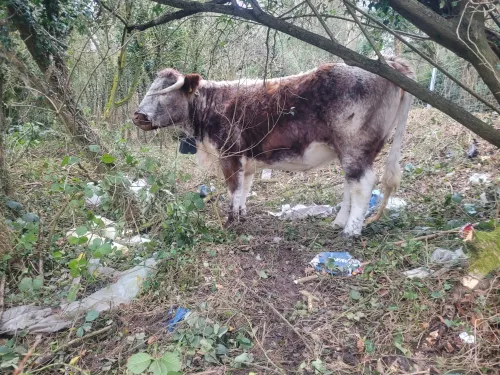
Kent Wildlife Trust is appealing for volunteers to help remove rubbish from Heather Corrie Vale nature reserve, Dareth Valley after cows were found to be grazing in areas strewn with litter.
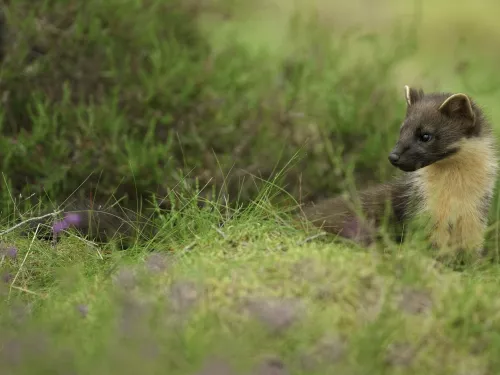
A collaboration of conservationists is examining the feasibility of a Pine Marten reintroduction to the South East. People are being asked for their views on restoring the Pine Marten to the region.